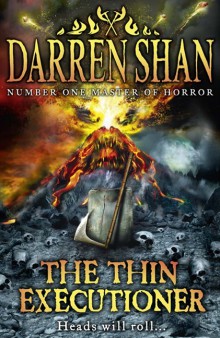The Thin Executioner is something of a departure for Darren Shan; as well as being his only standalone novel it centres on the twin themes of historical fantasy and dark mythology rather than on contemporary horror, Shan’s regular genre. Meticulously researched and set in a well-crafted, fictionalised version of the ancient Middle East, The Thin Executioner is a coming-of-age story that weaves truth together with myth to expose long forgotten and often brutal practices and beliefs.
In the kingdom of Wadi, a land of barbaric slavery where death is a form of entertainment, Rashed Rum is revered and treated almost royally for being the official executioner. In a massively divided society like that of Wadi, rank and prestige are everything but, realising that all good [and profitable] things must come to an end, after yet another successful execution, Rashed announces his retirement. However, just because he is getting a bit too frail to wield the executioner’s axe with precision, Rashed doesn’t want his family to lose their income and social standing and so publically announces that his two eldest sons will compete in the competition to decide who will be the new executioner.
It’s all a bit of a kick in the teeth for Jebel, Rashid’s rather thin and weedy youngest son. Humiliated by this public exposé of his father’s lack of faith in him, Jebel is determined to win the competition, succeed his father and use the kudos that the role of executioner would bring him to convince Debbat, the cold and calculating daughter of the ruler of Wadi, to marry him. Realising that he would not stand a chance of winning in the natural order of things, Jebel decides to undertake a quest to Tubaygat so that he might petition the god Sabbah Eid to grant him the gift of invincibility. Sounds like a fun road trip, only there is one snag – the quest will only be a success if Jebel can find someone who is willing to be sacrificed to Sabbah Eid on his behalf. You’d think that there wouldn’t be many volunteers, but [fortunately?] life for slaves in Wadi is despicably harsh and so a slave named Tel Hasani agrees to accompany Jebel and, ultimately, to be sacrificed, provided that Jebel agrees to free his family.
The Thin Executioner begins perhaps a little slowly, particularly compared to the books making up The Saga of Darren Shan and The Demonata, but it grows to become a gripping, complex tale about friendship, loyalty, the clash of religions and cultures, and the importance of having the courage to stand up for what you know to be right. That might sound like a rather preachy summary for a young adult novel but, while the moral aspects of the story are very clearly [sometimes rather too basically] spelled out, there is also a great deal of excitement and suspense to be found in the story too. Fans of Darren Shan’s other works will probably be pleased to know too that, while it is certainly more fantasy than horror, there is a good amount of gruesomeness to be found in The Thin Executioner, with the descriptions of the various executions carried out by Rashed Rum being particularly graphic.
Darren Shan has included a great deal of descriptive detail in The Thin Executioner and has succeeded marvellously at evoking the places that Jebel and Tel Hasani journey to and the people that they meet. They travel around a great deal in the book and there are many, frequently unusual, place names to remember but, luckily, there is a handy map at the front of the book which provides a useful reference point. Jebel grows and matures a great deal during the course of The Thin Executioner as he comes to understand life outside of Wadi and to appreciate that all people, even slaves, have worth. He is a likeable main character who, even though his circumstances and motivations are very different from those of teenagers today, is at the same time very relatable. The adventures that Jebel and Tel Hasani end up in and the various characters, both good and bad, that they encounter on the way to Tubaygat are exciting and ensure that readers are hooked on the story until the very end. There were occasional rather forced moment, for instance the inclusion of the Master Bush and Master Blair characters, but they didn’t detract from the pace and tone of the story for long. Ultimately, while The Thin Executioner is clearly a different style of story to Darren Shan’s other, popular novels, it is still an excellent and highly recommended read.
